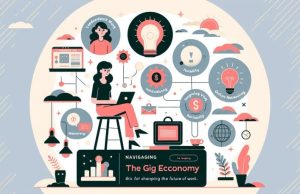In the bustling arenas of modern commerce and innovation, the pursuit of growth has become an almost sacrosanct goal. However, this relentless drive raises an existential question that percolates through the cubicles and boardrooms of today’s corporations: Can a growth mindset truly coexist with sustainable work practices? The challenge is not merely operational but philosophical, touching the very ethos of what it means to be a progressive, forward-moving society.
As we stand on the precipice of a future demanding sustainable and responsible business models, we are faced with a paradox that intertwines the hunger for personal and corporate advancement with the pressing need for environmental stewardship and ethical workplace conduct. The apparent dissonance between these objectives prompts a critical discussion around reconciling a growing economy with the finite resources of our planet.
The growth mindset, a concept popularized by psychologist Carol Dweck, champions the idea that abilities and intelligence can be developed through dedication and hard work. It’s a seductive narrative that marries well with corporate aspirations of endless expansion. Yet, when viewed through the lens of sustainability, this mindset encounters a web of complex challenges.
Legions of workers and leaders alike wrestle with cognitive dissonance as they navigate the crossroads of ambition and sustainability. Questions emerge: How do we balance the drive for continuous improvement with the responsibility to conserve? Can we redefine success beyond quarterly earnings to encompass the health of our communities and ecosystems?
Organizations worldwide have begun to address these quandaries, and some have started to pave the way forward. We see pioneering companies integrate circular economy principles into their business models, prioritizing the reuse and recycling of materials to minimize waste. Others invest heavily in renewable energy, recognizing the long-term cost savings and brand enhancement that come with a reduced carbon footprint.
One such case study is a tech giant that has committed to carbon neutrality, not just in direct operations but across its entire supply chain. This ambitious goal required radical transparency, innovative partnerships, and a willingness to invest in unproven technologies. Their journey illustrates the power of aligning growth objectives with sustainability by reimagining what growth itself entails.
Another inspiring example comes from a consumer goods company that redefined success by setting equally rigorous targets for reducing water consumption, improving worker conditions, and enhancing community engagement, alongside their financial goals. Their leadership in corporate responsibility has not only improved their brand’s reputation but has also driven industry-wide change.
Despite these success stories, the paradox of progress remains a hotly debated topic. Aligning a growth mindset with sustainable practices often requires a fundamental shift in corporate culture, a reevaluation of metrics of success, and an open-minded approach to innovation. It demands that companies foster an environment where development and well-being march hand in hand, and where innovation serves not just the market, but the planet and its people.
As readers and thought leaders akin to those of The Washington Post, The New Yorker, and The New York Times, we are called upon to engage in this dialogue. We must share insights and drive the discussion forward, recognizing that the delicate balance between growth and sustainability is more than an academic debate—it’s a blueprint for our collective future in the workplace.
We invite you to join the discussion. How can industries reconcile these seemingly disparate goals? What are the leadership qualities needed to navigate this complex terrain? Share your thoughts and become part of the solution to one of the most critical challenges of our time.

























